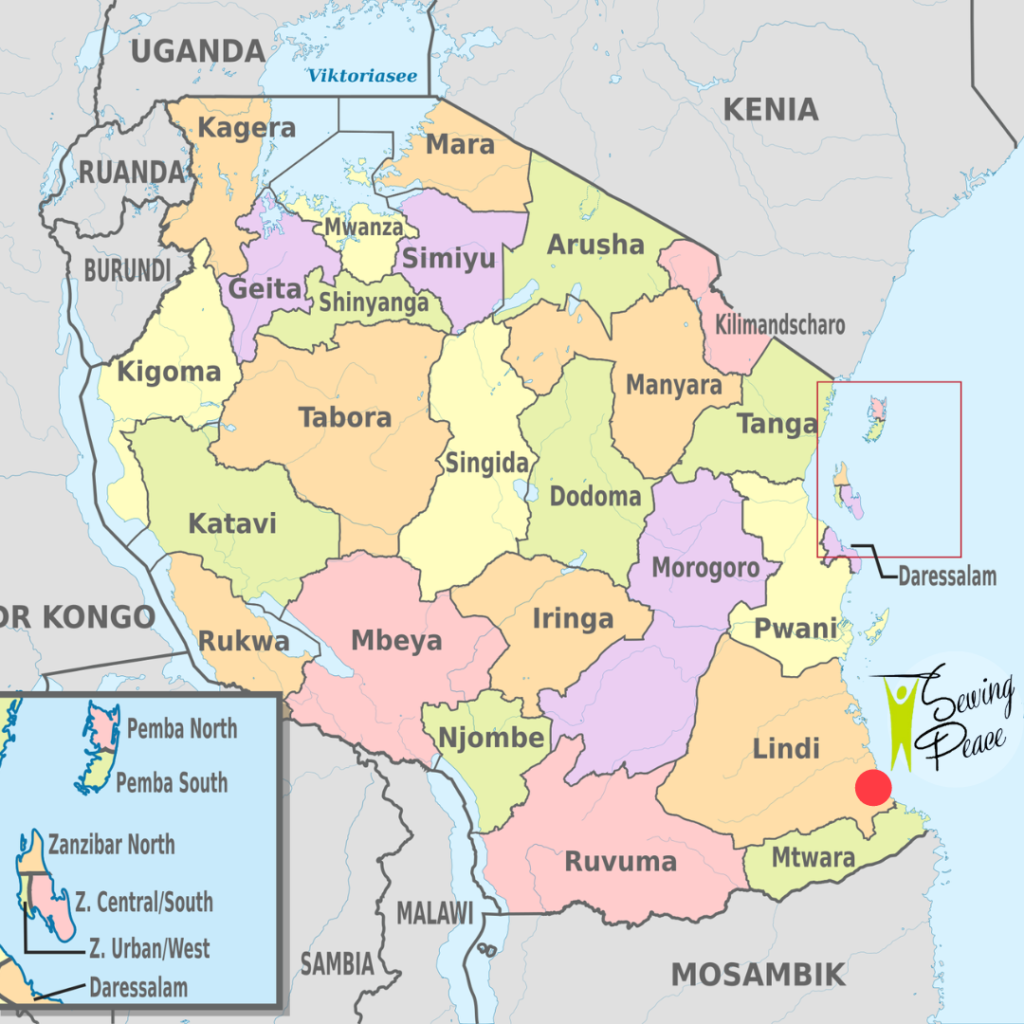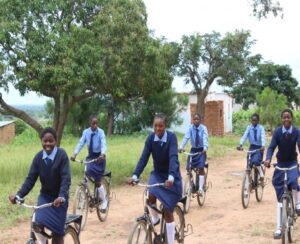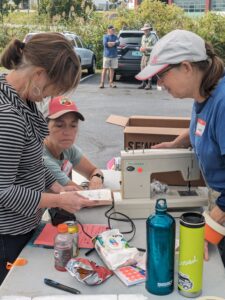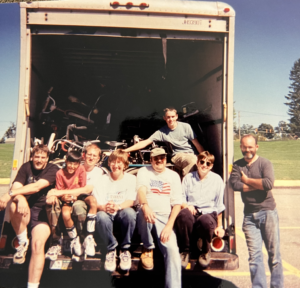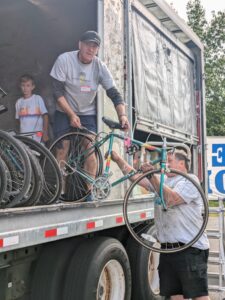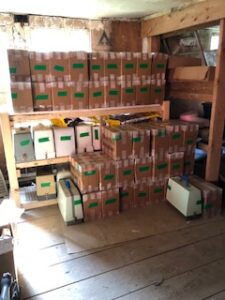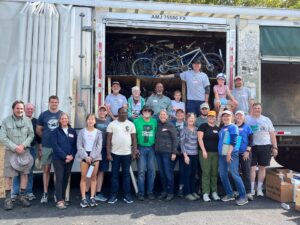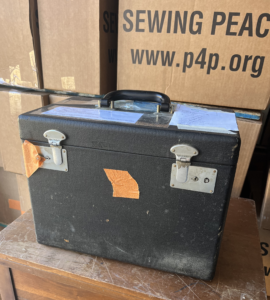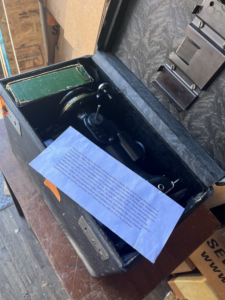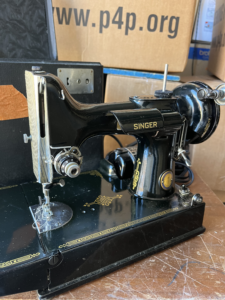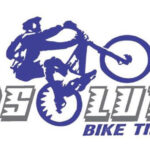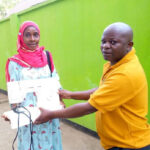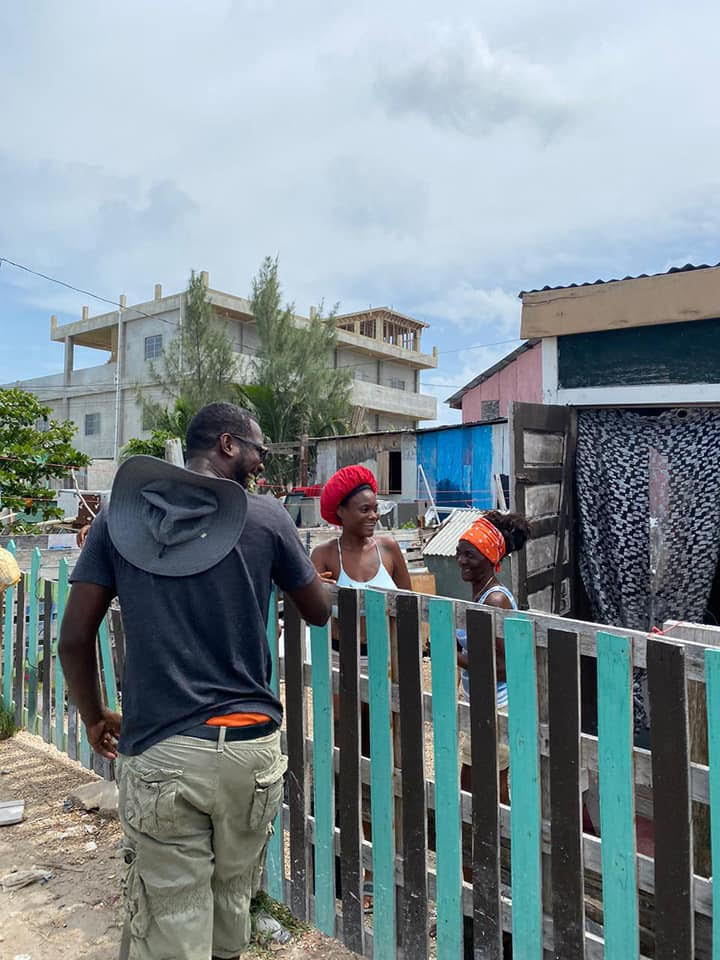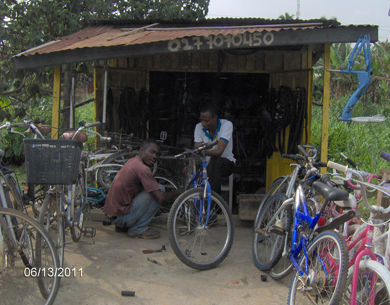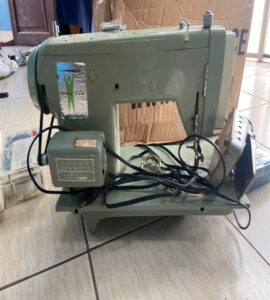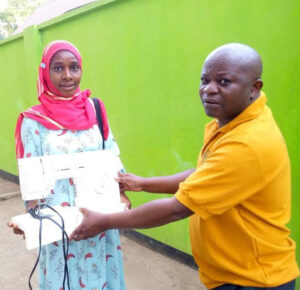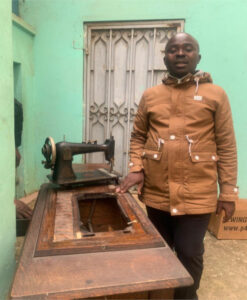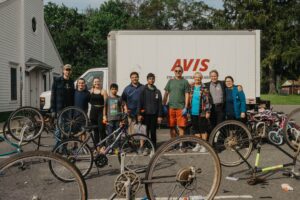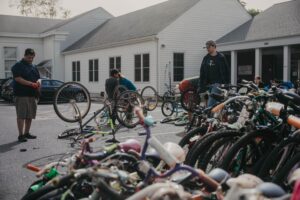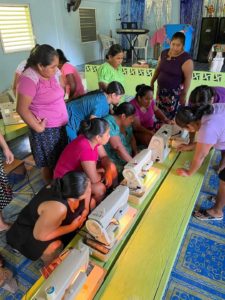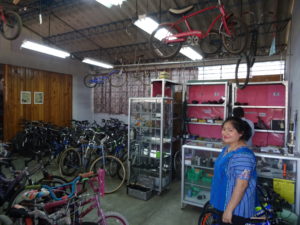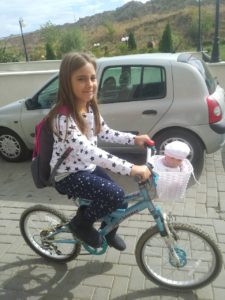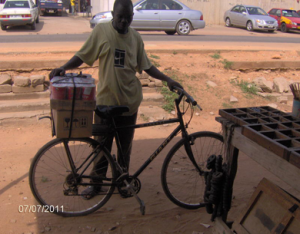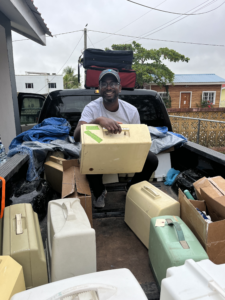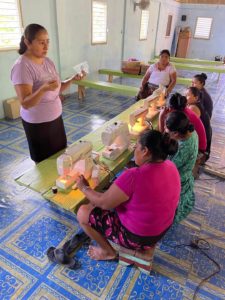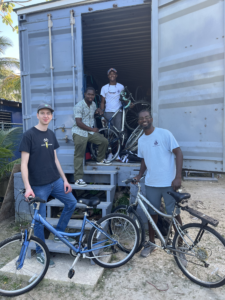Pedals for Progress, a New Jersey nonprofit corporation, empowers sustainable economic development by recycling bicycles and sewing machines from the U.S. and shipping them to motivated people in the developing world. Pedals for Progress (P4P) is a nonprofit charity incorporated under the laws of New Jersey, and registered with the Internal Revenue Service as a tax-exempt charity under section 501(c)(3) of the federal tax code (EIN: 22-3122003). An eleven-member unpaid board of trustees oversees a paid staff of 2 and a network of hundreds of volunteers.
2023 HIGHLIGHTS
Pedals for Progress shipped 5 containers and 3 LCL (Less than Container Load) shipments for a total of 2,161 bicycles, and 417 sewing machines, to 5 nonprofit agency partners in 5 developing countries. This brings cumulative donations shipped since 1991 to 164,932 bicycles, 6,173 sewing machines.
We concentrated our collection operations within the New York City and Philadelphia suburbs increasing our efficiency. Our bicycle and sewing machine collections were sponsored by 32 community partners in four states.
2023 Shipments
Recipients of Fiscal 2023 Bicycle Container Shipments
- Association Défi et Révolution de la Vie Rural (DRVR), Togo (381 bicycles and 100 sewing machines)
- Fundación Integral de Desarrollo Sostenible y Medio Oriente (FIDESMA), San Andres Ixtapa, Guatemala (913 bikes and 35 sewing machines in two shipments)
- P4P/Belize, Belize (867 bicycles and 120 sewing machines in two shipments)
Started the year 10/1/22 with 646 bicycles in inventory.
Ended the year 9/30/23 with 320 bicycles remaining in inventory.
2023 Total Shipped: 2,161, Total Collected: 1,835
Bicycle Shipments by Region
|
Fiscal 2023 |
Fiscal 2022 |
| Africa |
18% |
60% |
| Asia |
0% |
0% |
| Central America |
82% |
40% |
| Eastern Europe |
0% |
0% |
Recipients of Fiscal 2023 Sewing Machine LCL Shipments
- Norbert and Friends Missions, Tanzania (72 sewing machines)
- Mityana Open Troop Foundation, Uganda (90 sewing machines)
Started the year 10/1/22 with 220 sewing machines in inventory.
Ended the year 9/30/23 with 221 sewing machines in inventory.
2023 Total Shipped: 417, 2023 Total Collected: 418
Sewing Machines Shipments by Region
|
Fiscal 2023 |
Fiscal 2022 |
| Africa |
63% |
78% |
| Asia |
0% |
0% |
| Central America |
37% |
22% |
| Eastern Europe |
0% |
0% |
OVERSEAS PARTNERS
During the year, Pedals for Progress focused on a small number of reliable partners for the majority of our shipments.
The most critical factors in creating a sustainable, self-financing partnership are shipping costs and effective administration by our overseas partners. We currently consider 3 partnerships as sustainable, i.e., capable of paying for successive shipments. Experience has proven that when the shipping costs are at or below $15 per bike or $10 per sewing machine, with good management, this cost is low enough to sustain a self-financing partnership. Without charitable donations, grants or other funding, Pedals for Progress is limited to working primarily in Central America and the Caribbean, while Africa and Eastern Europe require subsidies to pay their higher shipping costs. Overseas distribution success is determined by per unit cost. Landlocked countries remain beyond our reach due to excessive inland transportation costs. Domestic shipping is also expensive; our domestic inland trucking costs to get shipments to port have more than doubled in the last five years.
While our primary goal is to supply environmentally sound transportation to communities and stimulate the greater movement of goods and services, our partners often generate extra funds from the bikes we ship them. These windfall funds, in turn, finance a breadth of community development activities.
Still, we are hopeful that other partner organizations, including some that did not receive bikes in 2023, will pay all or most expenses for new shipments in fiscal 2024, or subsidies will be found to initiate new programs.
Continuing Partners
- Guatemala: Fundación Integral de Desarrollo Sostenible y Medio Oriente (FIDESMA), San Andrés Itzapa, Chimaltenango
- Tanzania: The Norbert and Friends Foundation, Arusha
- Togo: Association Défi et Révolution de la Vie Rurale (DRVR), Vogan
- Uganda: The Mityana Open Troop Foundation, Mityana
- Belize: P4P/Belize, Belize City
New Partners 2023
There were no new partners to report in fiscal year 23. Special attention was given to maintain current partnerships that needed increased focus to help them regroup costs due to ripple effects of the pandemic. We are planning to open new international partnerships in fiscal year 24.
FINANCES
2023 was a good year for Pedals for Progress finances. We started fiscal 2023 in a strong financial position with a strong balance sheet. Our operating income relies on four primary income streams: cash donations with bikes and sewing machines, cash donations from the twice-annual solicitation, corporate donations, and revolving funds and fees from our international partners. Solicitations were better than previous year, with larger donations from a couple long-term supporters helping us meet our solicitation goals. Direct corporate donations have been decreasing over the past twenty years due to a focus on employee matching programs. Our sustaining international partners are expected to reimburse Pedals for Progress for the cost of containers or LCL shipments. These are categorized as “revolving funds”: the partners save income to pay for successive shipments. This category met expectations as the number of containers shipped to sustaining partners met the plan. Overall, 2023 operating income exceeded budget.
Operating expenses include four large categories: employee and officers’ compensation, shipping and packing, collections expenses, and office rent. Shipping and packing expenses were higher than expected largely due to the increased cost of shipping and fuel. Collection expenses, office rent, and all remaining minor expenses categories met expectations.
P4P in 2023 had a few extraordinary items. P4P has a conservative investment policy. 2023 was a good period for stocks, bonds, and mutual funds as they generally increased in value. These generated other income for P4P as did some of the stock donations.
Overall, 2023 exceeded financial expectations for P4P.
Balance sheet and profit and loss statements are attached.
CORPORATE DONORS
FedEx continues to deliver to New Jersey, at no cost, the bicycles collected by the Green Mountain Returned Peace Corps Volunteers, based in Burlington, Vermont.
General Pallet, at no cost, supplies the specialized pallets required for international shipping of SP sewing machines.
Berna Construction, donated construction time of a safety railing at our new loading dock.
Davara Industrial successfully donated costs of moving our storage containers.
Kent Bikes donated bicycle parts at no cost.
Thank you to the many corporations that participate through matching gifts.
We are very thankful for the support of these organizations and the recognition they have given us.
KEY VOLUNTEERS
Pedals for Progress depends on the efforts of volunteers, several hundred of them, to publicize and work collections, prep bikes for shipping, help us warehouse bikes, and eventually load them into containers bound for our partner agencies overseas.
We would like to thank Daryl Detrick with the Warren Hills Regional HS Computer Science Club for all of their volunteer hours helping to pack outgoing shipments. A special thanks to Michael Sabrio for managing at bike collections and taking over the Webmaster duties. We thank our Tinkerers Dennis Smyth, Paul Lemaire and Mary O’Brien for their excellent work refurbishing many of the sewing machines we shipped.
We especially thank these collectors:
- Anne Fitzgerald with Memorial United Methodist Church: 163 bikes and 83 sewing machines and for her time spent on the Board of Trustees
- Christine Potts with St. John’s Episcopal Church: 196 bikes and 27 sewing machines
- Jerry Agasar with the Newtown Rotary Club: 158 bikes and 30 sewing machines
- Daryl Detrick with the Warren Hills HS Computer Science Club: 101 bikes and 39 sewing machines
- Casey Walsh with Faith Lutheran Church: 94 bikes and 18 sewing machines
- Martha Clarvoe and the Otsego ReUse Center: 72 bikes and 29 sewing machines and making arrangements for domestic trucking
2023 COLLECTION SPONSORS
- First United Methodist Church Somerville, NJ
- Westfield Rotary Club
- St. John’s Episcopal Church
- Livingston Rotary Club
- Vineland Rotary Club
- Grace Episcopal Church
- Chester Co. Solid Waste Authority
- Newtown Rotary Club
- Ostego ReUse Center
- Women’s Club of Paramus
- Piscataway Magnet School
- Monmouth Social Club
- Rotary Club of the Rockaways
- Blair Academy
- Colts Neck Reformed Church
- Deleware Recreation Commission
- Bernardsville United Methodist Church
- Warren Hills HS Computer Sci Club
- Fair Lawn Rotary Club
- Returned Peace Corps Volunteers of Long Island
- Rotary Club of Norristown
- Passaic Co. Office of Solid Waste
- Clinton Presbyterian Church
- Rotary Club of the Palisades
- Doylestown United Methodist Church
- Faith Lutheran Church
- Pedals for Progress
- Rotary Club of Branchburg
- Memorial United Methodist Church
- New Dover United Methodist Church
- First United Methodist Church
- St. Stephens United Church of Christ
PROGRAM CHALLENGES
Pedals for Progress began the year on a strong and positive note and we were able to maintain strong financial standing. We still faced challenges stemming from rippling effects of the COVID-19 Pandemic, inflation, and increased prices of gasoline and shipping.
The planned action to elect Alan Schultz as President in August 2022 to take over operations from founder David Schweidenback has been completed and Mr. Schultz was able to maintain FY23 finances, budget, and collection efforts. The burdensome salary line from FY22 has subsided and leveled out to become manageable in FY23.
The bicycles collected this year continue to be the highest quality bikes that we have ever collected. The most common brand name was Trek and we collected over 80% mountain bikes in the adult bike category. The vast majority of bikes we collected were originally sold in a bike shop for a relatively high price. P4P collected almost no lesser quality mass merchandise bikes that are sold at big box stores like Walmart. Though the quality of bikes was higher than ever, our volume was significantly down due to the pandemic. The fall collection season was successful and helped us ship the majority of our five containers for the 2023 fiscal year. Spring collections were down compared to our history but improved from the year before. As we are reliant on the success of collections to keep us financially active, we had to rely heavily on our summer solicitation to help us keep up with our added salary line and general operations.
The summer solicitation was successful, and these donations allowed us to finish off the year on a positive note and remain cash positive.
Pedals for Progress developed partnerships worldwide to diversify relationships and reduce the risk of events in one country or region negatively affecting our operations. Since reduction of transportation costs is doubtful, we are seeking sponsorships to supplement our African and other high cost partnerships. Partner programs in Central America, which have a landed cost of under $15 per bike, are successful financially and require no further subsidies to continue shipments. P4P inland partners in Eastern Europe and Africa will fail without financial support. International shipping costs in these regions run from $16 per bike on the coast to as high as $38 inland (Uganda).
Shipping the sewing machines within bicycles shipments makes the delivery of these heavy objects affordable. However, our bicycle partners need relatively few sewing machines. The challenge is to find the funding to deliver machines to small sewing programs like the Mityana Open Troop Foundation in Uganda or to get them delivered very inexpensively. Most new sewing projects require only two pallets of machines. Due to that low volume, initial shipments were previously shipped via air freight, which is very expensive. P4P developed in 2013 the capacity to ship by boat individual pallets of sewing machines at a very reasonable cost. This low-cost shipping allows us to expand our small standalone sewing machine projects globally.
GOALS FOR 2024
During fiscal 2024, Pedals for Progress plans to ship approximately 3,600 bicycles and 600 sewing machines. Collection sites where we send our personnel will be limited to the greater suburbs of New York and Philadelphia. Bicycles collected outside this region need to be delivered to our New Jersey warehouse by the collection sponsors.
Pedals for Progress challenges are financial, not supply-side driven. With more funding, we can collect significantly more bikes within our current footprint and initiate more programs internationally. Increasing production requires more staff for attending potential collections and more vehicles on the road. The operational costs of producing the bicycles and sewing machines are significant. P4P is unable to accept bicycles without an accompanying cash donation; this limits production. Most large charities do not like to give money for operational expenses, but in our case, it is the collection efforts that produce the product we deliver. In many ways, you can think of P4P as a trucking company. Every trip in the truck produces more bicycles and sewing machines, our products. These products make the difference globally by helping people in need help themselves.
2023 BOARD OF TRUSTEES
- Jamie Acosta
- Jerry Agasar
- John Alexander, Secretary and Assistant Treasurer
- Daryl Detrick
- Ann Fitzgerald
- Richard Millhiser, Chair
- David Schweidenback, treasurer and VP, International Programs
- Casey Walsh
- Andrew Williams
STAFF
- Alan Schultz, President
- David Schweidenback, Vice President, International Programs and Founder
- Michael Sabrio, Webmaster
- Robert Delghiaccio, Warehouseman
- Otto Hintz, Warehouseman
- Evan Vaccarella, Warehouseman
- Joel Ortega. Warehouseman
- Max Von Orman, Warehouseman
Further information about Pedals for Progress is available at www.p4p.org. This includes our financial statements, IRS Form 990s, and information about our 501(c)(3) nonprofit tax-exempt status.
To receive our newsletters or information on how to collect bikes and/or sewing machines, contact alan@p4p.org. To request a donation of a container of bicycles or sewing machines, contact Dave at dschweidenback@gmail.com
2023 Financial Statements
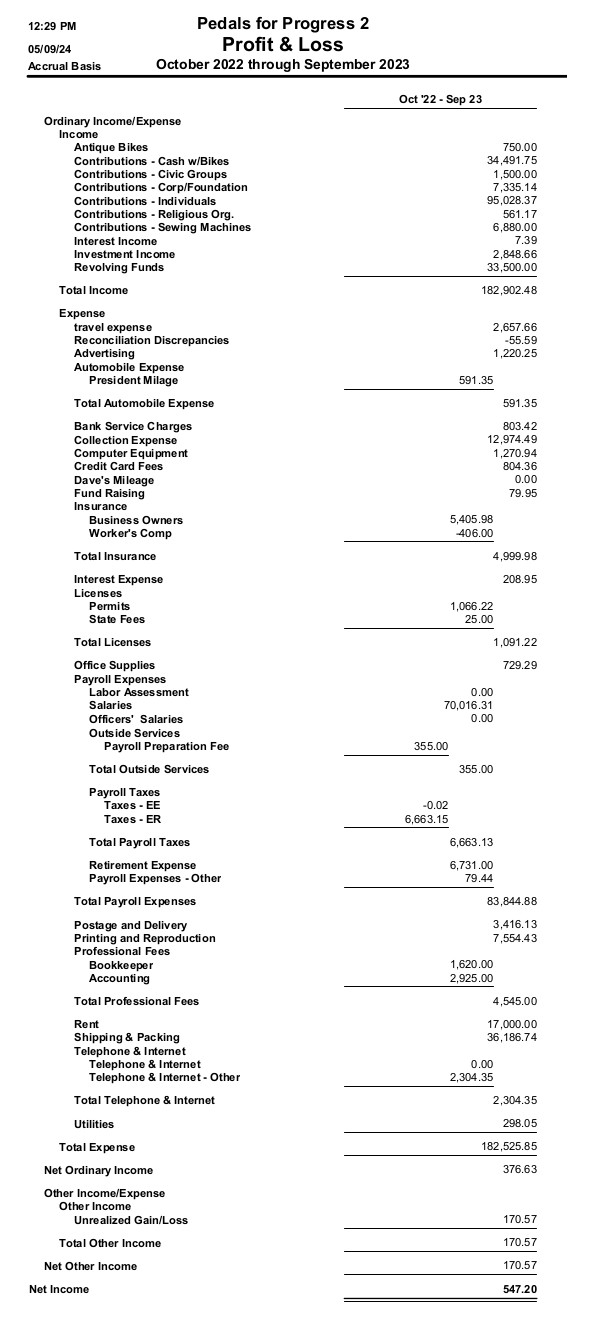
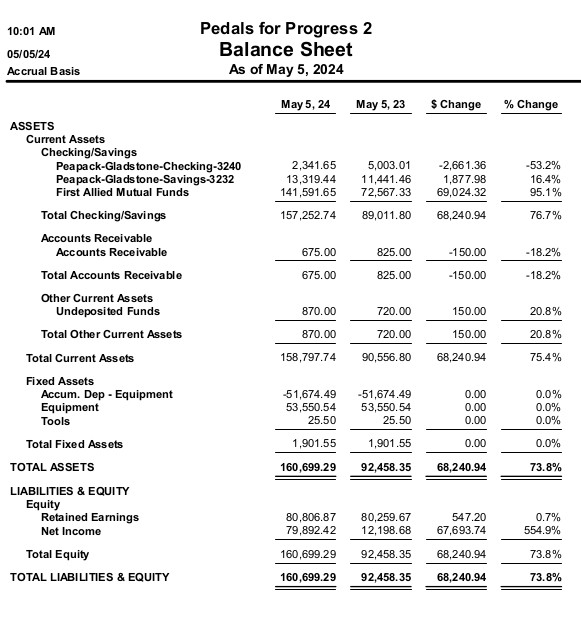
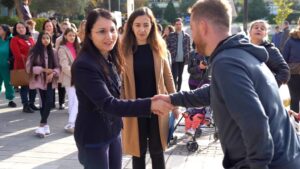
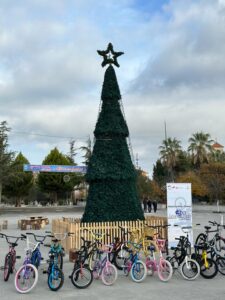 Absolute Bike Tirana organised “Cycling Towards Hope”, where 25 bicycles were donated to children and adults alike, creating smiles that lit up their faces. Recognizing the importance of mobility, especially for those living in areas with long distances to cover, the gift of bikes aimed to facilitate transportation to work and other daily activities. The act of generosity provided a means of commuting and fostered a sense of community and togetherness.
Absolute Bike Tirana organised “Cycling Towards Hope”, where 25 bicycles were donated to children and adults alike, creating smiles that lit up their faces. Recognizing the importance of mobility, especially for those living in areas with long distances to cover, the gift of bikes aimed to facilitate transportation to work and other daily activities. The act of generosity provided a means of commuting and fostered a sense of community and togetherness.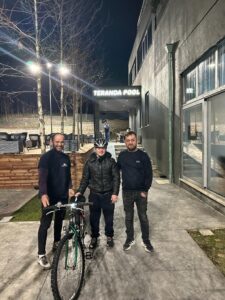
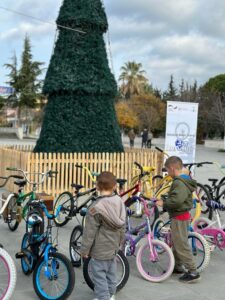 As we reflect on these heartwarming initiatives and individual achievements, it becomes evident that the end of the year was not just a time for festivities but also a period of selflessness and community support. The acts of kindness in Lushnje and Divjaka, along with Gerti Troka’s swimming triumph, remind us of the positive impact we can make when we come together to support one another. As we embrace the new year, let these stories serve as a source of inspiration to continue fostering compassion, understanding, and goodwill within our communities.
As we reflect on these heartwarming initiatives and individual achievements, it becomes evident that the end of the year was not just a time for festivities but also a period of selflessness and community support. The acts of kindness in Lushnje and Divjaka, along with Gerti Troka’s swimming triumph, remind us of the positive impact we can make when we come together to support one another. As we embrace the new year, let these stories serve as a source of inspiration to continue fostering compassion, understanding, and goodwill within our communities.
